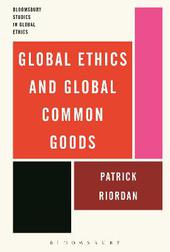
|
Global Ethics and Global Common Goods
Paperback / softback
Main Details
Description
Patrick Riordan takes a different approach to the questions of global ethics by following the direction of questioning initially pioneered by Aristotle; for him the most basic question of ethics is 'what is the good life'? So in the context of contemporary global ethics the Aristotelian questioner wonders about the good life on a global scale. Global Ethics and Global Common Goods fills the gap in existing literature caused by the neglect of the topic of the good in global ethics. Beginning by outlining answers to questions such as 'what is good?' and 'is there a highest good?' Riordan demonstrates the value of a common good perspective in matters of universal human rights and their institutions and practices, the study of international relations and the construction of global institutions, and debates about global justice between cosmopolitanism, nationalism and economic globalization. Philosophical questions provoked by these debates are identified and pursued, such as the question of a common human nature which seems presupposed by the language of universal rights. For experienced students of political philosophy and international relations this is a crucial text in the literature exploring the possibilities for politics on a world scale, while the perspective of the common good adds a new and distinctive dimension to current debates on global security and the challenges of managing conflict.
Author Biography
Patrick Riordan teaches political philosophy at Heythrop College, University of London, UK. He is a member of the Heythrop Institute: Religion & Society. His previous publications include A Grammar of the Common Good: Speaking of Globalization (Continuum, 2008).
ReviewsRiordan's Global Ethics and Global Common Goods is exceptional. Richly theoretical debates about distinctions between liberal notions and common good notions run alongside more practically focused debate about how to find agreement in the quest for international cooperation. This much-needed book draws upon an ancient tradition to generate an innovative trajectory in global ethics today. * Esther D. Reed, University of Exeter, UK * The expression 'the common good' is often uttered but rarely analysed; indeed it is often little more than a political cliche. In this timely study Patrick Riordan engages in analysis drawing upon classical sources and contemporary arguments and provides a clear and very useful treatment of the concept, revealing its richness and applicability in relation to global moral and social philosophy. * John Haldane, FRSE, Professor of Philosophy and Director of the Centre for Ethics, Philosophy and Public Affairs, University of St Andrews, UK * The importance of the book's topic cannot be overestimated and the author is clearly familiar with the literature ... [It] provides a good introduction, not only to the topic itself but also to several relevant authors. * Ethical Perspectives * Natural law ethics begins from a variety of basic goods. It asks what are the goods that constitute that variety, and how individuals can adequately respond to these goods. What is the corresponding political philosophy? What might a natural law global ethics look like? What has the natural law approach to say about the environment, the economy, international law, human rights? Patrick Riordan's philosophical exploration of these questions is careful, learned, ambitious, and ground-breaking. And it could not be more timely. * Timothy Chappell, Professor of Philosophy, Faculty of Arts, The Open University, UK *
|